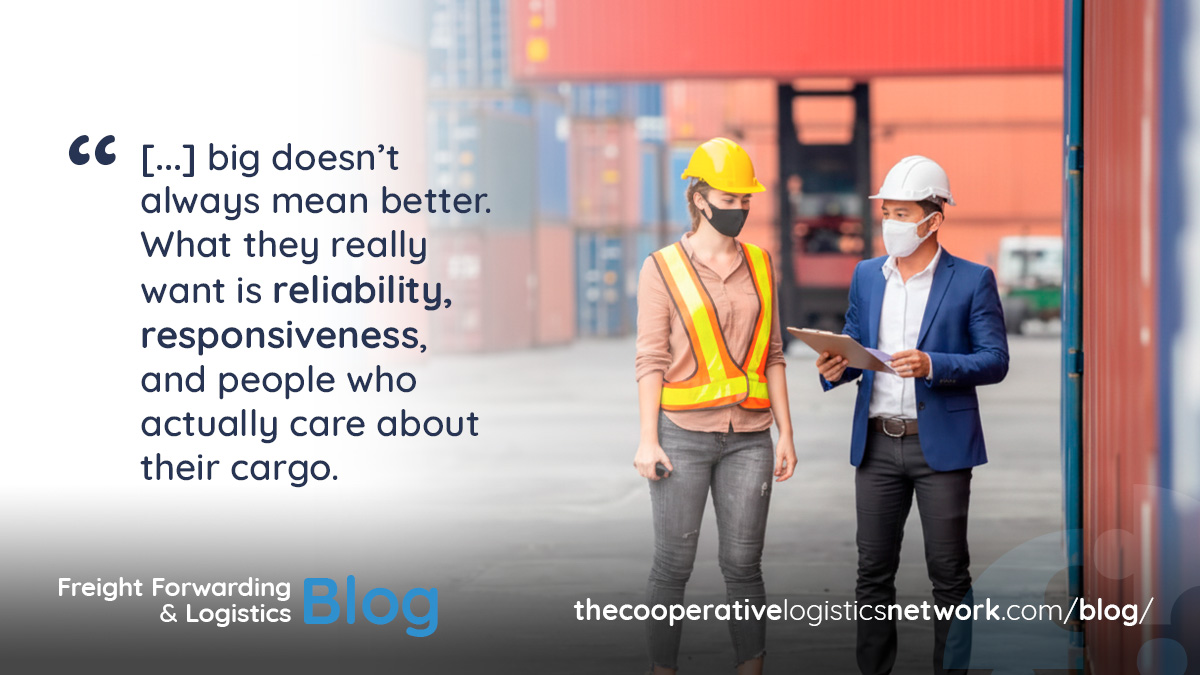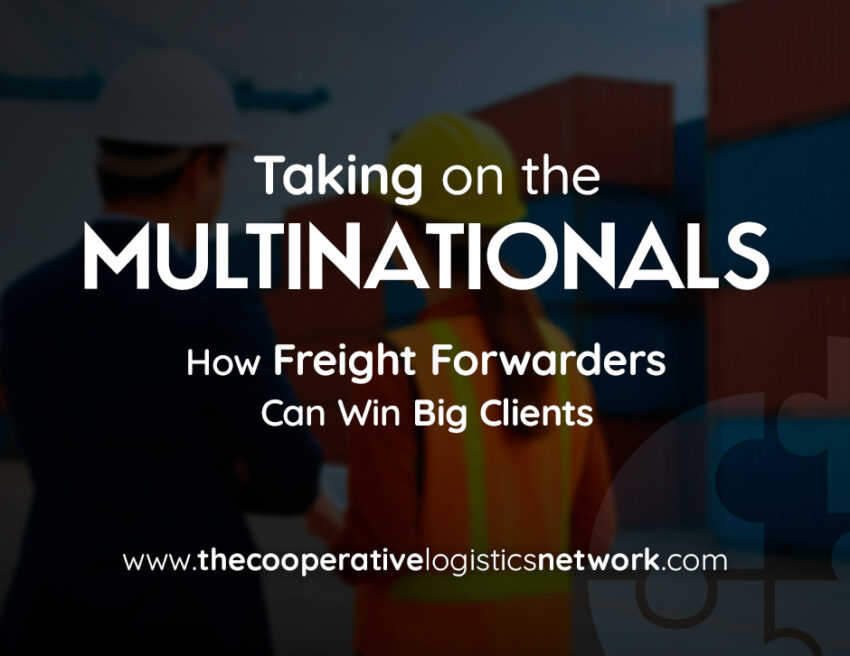Let’s be honest. Competing with the global logistics giants isn’t easy. They’ve got massive marketing budgets, fancy technology, and a global brand name that sounds reassuring to clients. So where does that leave small and mid-sized freight forwarders? Here’s the thing: many shippers are starting to realize that big doesn’t always mean better. What they really want is reliability, responsiveness, and people who actually care about their cargo. That’s where independent forwarders have a real shot at winning business back from the multinationals. Let’s break it down.
1. Use your size as your advantage
Large corporations move like cargo ships, steady, but slow to turn. You, on the other hand, can pivot quickly. When a client calls you directly and gets an answer in minutes instead of days, that agility leaves an impression. Clients dealing with multinational forwarders often complain about generic service and rotating account managers. You can give them a single point of contact, someone who knows their cargo, their routes, and even their preferred coffee order. That kind of personal attention builds loyalty fast. So instead of trying to imitate the big players, highlight what they can’t offer: flexibility, consistency, and genuine human connection.

2. Compete on expertise, not just on rates
A common trap independent freight forwarders fall into is assuming they have to undercut prices. Don’t. Competing only on cost is a race to the bottom. What wins clients is confidence, showing them that you understand their logistics challenges better than anyone else.
For example, if a potential client ships temperature-sensitive goods, you can position yourself as a specialist in reefer logistics. If you handle complex customs procedures daily, showcase that knowledge in your proposal. Large companies rely on standardized systems; you can offer custom solutions. Educate your clients, don’t just quote them. When they see you as a trusted advisor instead of a vendor, price becomes secondary.
3. Strengthen your global capabilities through partnerships
Here’s the main reason many shippers choose multinationals, they think only the big players can handle shipments globally. That used to be true, but not anymore. Today, independent freight forwarders can build global reach by joining powerful freight networks like The Cooperative Logistics Network. With more than 360 hand-picked members across 138+ countries, The Cooperative gives you access to a pool of reliable partners who meet the same quality standards as you.
When you’re part of such a network, you’re not just a local forwarder anymore but a part of a worldwide system that can move cargo anywhere with the same efficiency as a multinational. The difference? You keep your independence, your name, and your direct client relationships.
Tell your clients that you can manage shipments from Shanghai to Santiago, or from Mumbai to Miami, through trusted partners who are all part of one cooperative family. That reassurance can easily tip the scales in your favor.
Not a member yet? Join us today!
4. Invest in communication and visibility
Clients leave large forwarders not because they fail at shipping, but because they fail at communicating. They want updates, transparency, and a sense that someone’s actually watching their cargo.
Use that to your advantage. Build a habit of proactive communication. Send quick shipment updates before clients ask for them. Share realistic timelines, not sugar-coated ones. And when there’s a problem that happens to everyone, own it early and fix it fast.
On top of that, invest in a simple digital presence that works:
-
Keep your website updated with clear services, recent shipments, and client testimonials.
-
Stay active on LinkedIn. Share small wins, photos of your team, and case studies.
-
If you’re part of The Cooperative Logistics Network, showcase that affiliation proudly, it signals credibility and global reach.
Clients don’t always pick the biggest name. They pick the name they trust most.
5. Use storytelling to humanize your brand
The big players talk in numbers and performance charts. You can talk in stories. Tell your clients how your team handled an urgent air shipment during a storm, or how you saved a customer from losing a key buyer because you went the extra mile. Stories make logistics relatable. They show that behind your operations are people who care. In an industry that often sounds mechanical, that authenticity stands out.
You can even use your membership in The Cooperative Logistics Network as part of your story:
“We’re part of a global network of reliable freight forwarders. So while we’re an independent company, we have partners worldwide who share our same values and service standards.”
That line alone puts you on the same level as multinational forwarders without the corporate distance.
6. Keep learning, keep evolving
The logistics industry changes fast, fuel surcharges, new customs systems, green shipping rules, AI-powered platforms. The best freight forwarders are those who never stop learning. Use your agility to adopt new technologies quickly. Attend industry webinars. Engage in The Cooperative’s training sessions and networking opportunities. The more informed and connected you are, the more confidence you project to clients. Remember, clients don’t expect perfection. They expect competence and commitment. Stay current, stay curious, and they’ll trust you with bigger and bigger shipments.
7. Build trust before you sell
Winning clients from big names isn’t about aggressive selling, it’s about proving reliability step by step. Offer to handle one lane or one shipment first. Deliver it flawlessly. Then follow up with data: on-time performance, savings achieved, transit improvements.
When you back your words with results, clients start shifting more business your way. And that’s where being part of The Cooperative Logistics Network truly pays off. The network’s reputation for trust and transparency adds weight to your pitch. You’re not just another small forwarder; you’re backed by a global organization known for quality and financial protection. That assurance gives clients the confidence to switch.
8. Play the long game
Multinationals often win clients with flashy marketing and lose them later with mediocre service. You can do the opposite. Focus on building relationships that last years, not months. Follow up after delivery, check if the client is happy, and anticipate their next need. The freight forwarding business is built on relationships, not transactions. Clients remember who picked up the phone on a Sunday, not who had the lowest quote.
Final thoughts
Here’s what it all comes down to: independent freight forwarders don’t need to act like multinationals to win their clients. They need to act like professionals who care. By combining local expertise with global support from The Cooperative Logistics Network, you can offer what the big names can’t, personal service with worldwide reach.
So, instead of asking “How can we compete?”, start asking “What can we do better?” Because in logistics, trust, agility, and real connection will always move faster than size.


